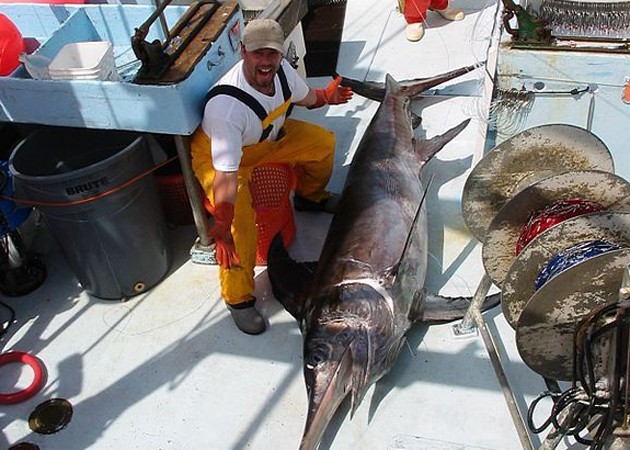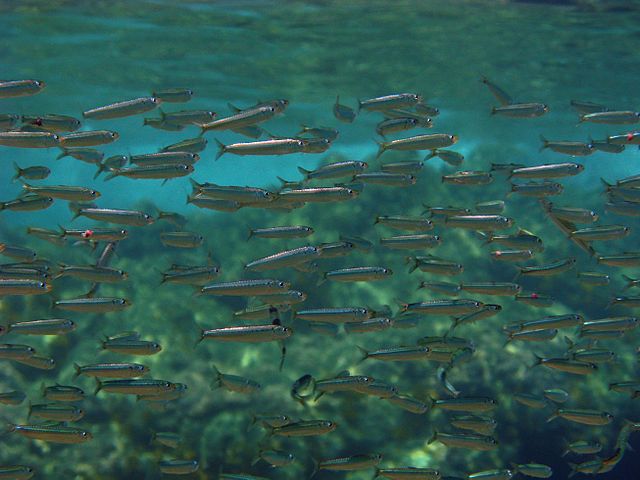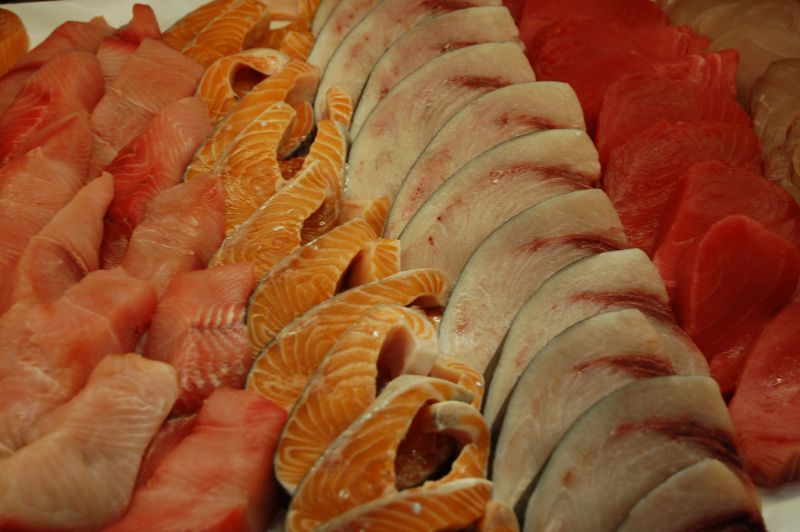
Large swordfish (Xiphias gladius) on deck during long-lining operations:Derke Snodgrass, NOAA/NMFS/SEFSC/SFD, via <a href="http://commons.wikimedia.org/wiki/File:Xiphias_gladius.jpg">Wikimedia Commons</a>.
The Marine Stewardship Council’s principles for sustainable fishing are “too lenient and discretionary,” according to a new analysis published in Biological Conservation. The MSC’s principles “allow for overly generous interpretation by third-party certifiers and adjudicators, which means that the MSC label may be misleading both consumers and conservation funders.” This is another black eye for the MSC, which was already failing its own strict standards for awarding the coveted “sustainable” label.
The World Wildlife Fund, one of the world’s biggest environmental groups, and Unilever, one of the world’s biggest seafood processors, founded the MSC in 1997 to provide “the best environmental choice in seafood.” But as I’ve reported here, here, here, and here—and as MoJo’s Tom Philpott reported recently here—the prestige of the MSC sustainable blue label has been eroded, challenged, and at times undermined by scientific assessment of the fisheries and genetic analysis of the fish going to market.
The authors of this latest study write:
Despite high costs and difficult procedures, conservation organizations and other groups have filed and paid for 19 formal objections to MSC fisheries certifications. Only one objection has been upheld such that the fishery was not certified. Here, we collate and summarize these objections and the major concerns as they relate to the MSC’s three main principles: sustainability of the target fish stock, low impacts on the ecosystem, and effective, responsive management.
Here are some of the lowlights of the MSC report card:
- Over the past decade, there have been 19 formal objections to Marine Stewardship Council (MSC) fisheries certifications
- Adjudicators have upheld only one objection: the Faroese Northeast Atlantic mackerel
- 12 percent of MSC fisheries have received formal objections
- By weight, these fisheries represent 35 percent of MSC-certified seafood
- Loopholes and loose wording in MSC standards allow for controversial fisheries to be certified
??

I wrote about one of these contested fisheries—the Gulf of California sardine—in my portrait of Mexican ecologist Enriqueta Velarde. She’s one of the the authors of this Biological Conservation paper who noted that the Gulf of California sardine is only one of several forage fish and other species at or near the bottom of the food chain that have been labeled sustainable, but whose populations are of great concern to scientists. From the paper:
The MSC has certified these small pelagic fisheries all over the world, including Antarctic krill (Euphausia superba), Norway spring spawning herring (Clupea harengus), Gulf of California sardine (Sardinops sagax) and Argentine anchovy (Engraulis anchoita). These forage species are important in the diets of seabirds, marine mammals and larger finfish and therefore the overfishing of forage fish can lead to declines in their predators. When sardines are available in the Gulf of California, they comprise up to 97% of the diet of some seabird species. Despite the importance of these small pelagic fish in supporting healthy ecosystems, few forage fisheries are managed in an appropriately precautionary fashion. A recent report recommended cutting catches of forage fish in half in many ecosystems, thereby doubling the minimum biomass of forage fish that must be left in the water. ?

The authors also found great fault with the sustainable label awarded to Canada’s longline swordfishery because of its extraordinarily high bycatch of other species. For the 20,000 swordfish “sustainably” hooked in Canadian waters yearly, longliners also catch 100,000 sharks, 1,200 endangered loggerhead turtles, and 170 leatherback turtles. As Yale Environment 360 reported: “When the MSC labels a swordfish fishery that catches more sharks than swordfish ‘sustainable,’ it’s time to re-evaluate its standards,” says lead author Claire Christian, director of the Secretariat of the Antarctic and Southern Ocean Coalition.















